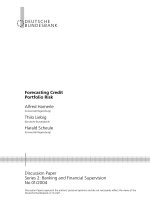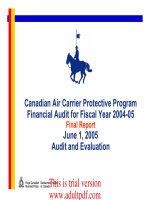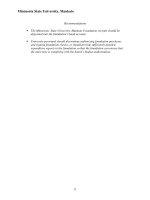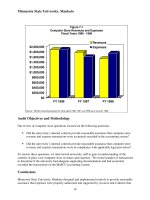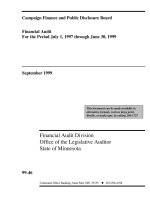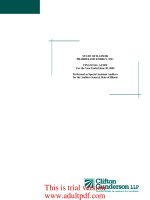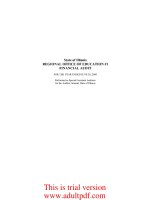Financial information for managemetn paper 1 2 2005 question
Bạn đang xem bản rút gọn của tài liệu. Xem và tải ngay bản đầy đủ của tài liệu tại đây (101.77 KB, 13 trang )
PART 1
FRIDAY 9 DECEMBER 2005
QUESTION PAPER
Time allowed 3 hours
This paper is divided into two sections
Section A
ALL 25 questions are compulsory and MUST be
answered
Section B
ALL FIVE questions are compulsory and MUST be
answered
Formulae Sheet is on page 13
Do not open this paper until instructed by the supervisor
This question paper must not be removed from the examination
hall
The Association of Chartered Certified Accountants
Paper 1.2
Financial
Information for
Management
Section A – ALL 25 questions are compulsory and MUST be attempted.
Please use the Candidate Registration Sheet provided to indicate your chosen answer to each multiple choice question.
Each question within this section is worth 2 marks.
1
Up to a given level of activity in each period the purchase price per unit of a raw material is constant. After that point
a lower price per unit applies both to further units purchased and also retrospectively to all units already purchased.
Which of the following graphs depicts the total cost of the raw materials for a period?
A
£
Units
0
C
£
2
Units
0
D
£
Units
0
B
£
Units
0
The following breakeven chart has been drawn showing lines for total cost (TC), total variable cost (TVC), total fixed
cost (TFC) and total sales revenue (TSR):
TSR
£
TC
TVC
TFC
Units
0
675
1,200
1,500
What is the margin of safety at the 1,700 units level of activity?
A
200 units
B
300 units
C
500 units
D
1,025 units
2
1,700
3
A company manufactures a single product with a variable cost per unit of £22. The contribution to sales ratio is 45%.
Monthly fixed costs are £198,000.
What is the breakeven point (in units)?
4
A
4,950
B
9,000
C
11,000
D
20,000
An organisation has the following total costs at two activity levels:
Activity level (units)
Total costs (£)
17,000
140,000
22,000
170,000
Variable cost per unit is constant in this range of activity and there is a step up of £5,000 in the total fixed costs when
activity exceeds 18,000 units.
What is the total cost at an activity level of 20,000 units?
5
A
£155,000
B
£158,000
C
£160,000
D
£163,000
The following statements relate to financial accounting or to cost and management accounting:
(i) The main users of financial accounting information are external to an organisation.
(ii) Cost accounting is part of financial accounting and establishes costs incurred by an organisation.
(iii) Management accounting is used to aid planning, control and decision making.
Which of the statements are correct?
6
A
(i) and (ii) only
B
(i) and (iii) only
C
(ii) and (iii) only
D
(i), (ii) and (iii)
The following terms relate to computers:
(i) Application package
(ii) Operating system
(iii) Spreadsheet
Which of the above terms are examples of computer software?
A
(i) and (ii) only
B
(i) and (iii) only
C
(ii) and (iii) only
D
(i), (ii) and (iii)
3
[P.T.O.
7
An organisation’s stock records for last month show the following transactions in respect of one item:
Date
1st
5th
13th
20th
28th
Receipts
(units)
Issues
(units)
Stock
(units)
300
200
800
500
300
100
600
300
200
The opening stock was valued at a total cost of £9,300 and all receipts on the 13th were purchased at a cost of £33
per unit.
The organisation uses the weighted average method of valuation and calculates a new weighted average after each
stores receipt.
What was the total value of the closing stock?
8
A
£9,500
B
£9,700
C
£9,750
D
£9,900
A company uses 9,000 units of a component per annum. The component has a purchase price of £40 per unit and
the cost of placing an order is £160. The annual holding cost of one component is equal to 8% of its purchase price.
What is the Economic Order Quantity (to the nearest unit) of the component?
9
A
530
B
671
C
949
D
1,342
A company determines its order quantity for a component using the Economic Order Quantity (EOQ) model.
What would be the effects on the EOQ and the total annual ordering cost of an increase in the annual cost of
holding one unit of the component in stock?
A
EOQ
Lower
Total annual ordering cost
Higher
B
Higher
Lower
C
Lower
No effect
D
Higher
No effect
4
10 Consider the following statements:
(i) Job costing is only applicable to service organisations.
(ii) Batch costing can be used when a number of identical products are manufactured together to go into finished
stock.
Is each statement TRUE or FALSE?
A
Statement (i)
False
Statement (ii)
False
B
False
True
C
True
True
D
True
False
11 An organisation absorbs overheads on a machine hour basis. The planned level of activity for last month was 30,000
machine hours with a total overhead cost of £247,500. Actual results showed that 28,000 machine hours were
recorded with a total overhead cost of £238,000.
What was the total under absorption of overheads last month?
A
£7,000
B
£7,500
C
£9,500
D
£16,500
12 The following information relates to a manufacturing company for next period:
Production
Sales
Units
14,000
12,000
£
63,000
12,000
Fixed production costs
Fixed selling costs
Using absorption costing the profit for next period has been calculated as £36,000.
What would the profit for next period be using marginal costing?
A
£25,000
B
£27,000
C
£45,000
D
£47,000
5
[P.T.O.
13 Information relating to two processes (F and G) was as follows:
Process
F
G
Normal loss as
% of input
8
5
Input
litres
65,000
37,500
Output
litres
58,900
35,700
For each process, was there an abnormal loss or an abnormal gain?
A
Process F
Abnormal gain
Process G
Abnormal gain
B
Abnormal gain
Abnormal loss
C
Abnormal loss
Abnormal gain
D
Abnormal loss
Abnormal loss
14 Last month 27,000 direct labour hours were worked at an actual cost of £236,385 and the standard direct labour
hours of production were 29,880. The standard direct labour cost per hour was £8·50.
What was the labour efficiency variance?
A
£17,595 Adverse
B
£17,595 Favourable
C
£24,480 Adverse
D
£24,480 Favourable
15 Last month a company’s budgeted sales were 5,000 units. The standard selling price was £6 per unit with a standard
contribution to sales ratio of 60%. Actual sales were 4,650 units with a total revenue of £30,225
What were the favourable sales price and adverse sales volume contribution variances?
A
Sales price
£
2,325
Sales volume contribution
£
1,260
B
2,500
1,260
C
2,325
2,100
D
2,500
2,100
16 Which of the following is an initial requirement of a management control system?
A
Establishing the standard to be achieved
B
Measuring the actual performance
C
Setting organisational objectives
D
Taking appropriate corrective action
6
17 Which one of the following would be classified as indirect labour?
A
Assembly workers on a car production line
B
Bricklayers in a house building company
C
Machinists in a factory producing clothes
D
Forklift truck drivers in the stores of an engineering company
18 The following statements relate to the calculation of the regression line y = a + bx using the information on the
formulae sheet at the end of this examination paper:
(i) n represents the number of pairs of data items used
(ii) (∑ x)2 is calculated by multiplying ∑ x by ∑ x
(iii) ∑ xy is calculated by multiplying ∑ x by ∑y
Which statements are correct?
A
(i) and (ii) only
B
(i) and (iii) only
C
(ii) and (iii) only
D
(i), (ii) and (iii)
19 The correlation coefficient (r) for measuring the connection between two variables (x and y) has been calculated as
0·6.
How much of the variation in the dependent variable (y) is explained by the variation in the independent variable
(x)?
A
36%
B
40%
C
60%
D
64%
20 The following statements relate to relevant cost concepts in decision making:
(i) Materials can never have an opportunity cost whereas labour can.
(ii) The annual depreciation charge is not a relevant cost.
(iii) Fixed costs would have a relevant cost element if a decision causes a change in their total expenditure
Which statements are correct?
A
(i) and (ii) only
B
(i) and (iii) only
C
(ii) and (iii) only
D
(i), (ii) and (iii)
7
[P.T.O.
21 A company is evaluating a project that requires 4,000 kg of a material that is used regularly in normal production.
2,500 kg of the material, purchased last month at a total cost of £20,000, are in stock. Since last month the price
of the material has increased by 21/2%.
What is the total relevant cost of the material for the project?
A
£12,300
B
£20,500
C
£32,300
D
£32,800
22 In a process where there are no work-in-progress stocks, two joint products (J and K) are created. Information (in
units) relating to last month is as follows:
Product
Sales
J
K
6,000
4,000
Opening stock of
finished goods
100
400
Closing stock of
finished goods
300
200
Joint production costs last month were £110,000 and these were apportioned to joint products based on the number
of units produced.
What were the joint production costs apportioned to product J for last month?
A
£63,800
B
£64,000
C
£66,000
D
£68,200
23 A company manufactures two products (L and M) using the same material and labour. It holds no stocks. Information
about the variable costs and maximum demands are as follows:
Material (£4 per litre)
Labour (£7 per hour)
Maximum monthly demand
Product L
£/unit
13
35
Units
6,000
Product M
£/unit
19
28
Units
8,000
Each month 50,000 litres of material and 60,000 labour hours are available.
Which one of the following statements is correct?
A
Material is a limiting factor but labour is not a limiting factor.
B
Material is not a limiting factor but labour is a limiting factor.
C
Neither material nor labour is a limiting factor.
D
Both material and labour are limiting factors.
8
The following information relates to questions 24 and 25:
A company has established the following selling price, costs and revenue equations for one of its products:
Selling price (£ per unit) = 50 – 0·025Q
Marginal revenue (£ per unit) = 50 – 0·05Q
Total costs per month (£) = 2,000 + 15Q
Q represents the number of units produced and sold per month.
24 At what selling price will monthly profits be maximised?
A
£15·00
B
£17·50
C
£25·00
D
£32·50
25 What would be the monthly profit if the selling price per unit was set at £20?
A
£1,000
B
£4,000
C
£6,000
D
£12,000
(50 marks)
9
[P.T.O.
Section B – ALL FIVE questions are compulsory and MUST be attempted.
1
Pointdextre Ltd, which manufactures and sells a single product, is currently producing and selling 102,000 units per
month, which represents 85% of its full capacity. Total monthly costs are £619,000 but at full capacity these would
be £700,000. Total fixed costs would remain unchanged at all activity levels up to full capacity. The normal selling
price of the product results in a contribution to sales ratio of 40%.
A new customer has offered to take a monthly delivery of 15,000 units at a price per unit 20% below the normal
selling price. If this new business is accepted, existing sales are expected to fall by one unit for every six units sold
to this new customer.
Required:
(a) For the current production and sales level, calculate:
(i)
(ii)
(iii)
(iv)
the
the
the
the
variable cost per unit;
total monthly fixed costs;
selling price per unit;
contribution per unit.
(6 marks)
(b) Calculate the net increase or decrease in monthly profit which would result from acceptance of the new
business.
(4 marks)
(c) In the context of decision making, explain the term ‘opportunity cost’ and illustrate your answer by reference
to Pointdextre Ltd.
(2 marks)
(12 marks)
2
Partlet Ltd makes a product that passes through two manufacturing processes. A normal loss equal to 8% of the raw
material input occurs in Process I but no loss occurs in Process II. Losses have no realisable value.
All the raw material required to make the product is input at the start of Process I. The output from Process I each
month is input into Process II in the same month. Work in progress occurs in Process II only.
Information for last month for each process is as follows:
Process I
Raw material input
Conversion costs
Output to Process II
Process II
Opening work in progress
Conversion costs
Closing work in progress
50,000 litres at a cost of £365,000
£256,000
47,000 litres
5,000 litres (40% complete for conversion costs) valued at £80,000
£392,000
2,000 litres (50% complete for conversion costs)
Required:
(a) Prepare the Process I account for last month.
(5 marks)
(b) Calculate in respect of Process II for last month:
(i) the value of the completed output; and
(ii) the value of closing work in progress.
(5 marks)
(c) If the losses in Process I were toxic and the company incurred costs in safely disposing of them, state how
the disposal costs associated with the normal loss would have been recorded in the Process I account. No
calculations are required.
(2 marks)
(12 marks)
10
3
JWW Ltd manufactures two products, X and Y, and any quantities produced can be sold for £60 per unit and £25
per unit respectively. Variable costs of the two products are:
Materials (at £5 per kg)
Labour (at £6 per hour)
Other variable costs
Total
X
£ per unit
15
24
6
–––
45
–––
Y
£ per unit
5
3
5
–––
13
–––
Next month only 4,200 kg of material and 3,000 labour hours will be available.
The company holds no stocks and aims to maximise its profits each month.
Required:
(a) State the objective function and constraints in a form suitable for solving by linear programming.
(5 marks)
(b) Determine the optimal production plan for next month (in units).
(4 marks)
(9 marks)
4
Ploverleigh Ltd, which manufactures a single product, uses standard absorption costing. The standard product cost
per unit is as follows:
Direct materials
Direct labour
Fixed production overhead
£
11
24
18
Budgeted and actual production for last month were 12,000 units and 12,500 units respectively. The actual costs
incurred last month were:
Direct materials
Direct labour
Fixed production overhead
£
142,700
291,300
230,800
Required:
(a) Prepare a statement that reconciles the standard cost of actual production with its actual cost for last month
and highlights the total variance for each of the three cost elements.
(4 marks)
(b) Provide a breakdown of the total fixed production overhead variance in your statement in (a) by calculating
two sub variances.
(2 marks)
(c) If Ploverleigh Ltd uses standard marginal costing instead of standard absorption costing, explain how AND
why any of the three total variances calculated in (a) would be different and state clearly which, if any, of
the variances would remain unchanged. No calculations are required.
(3 marks)
(9 marks)
11
[P.T.O.
5
Sangazure Ltd manufactures many different products in a factory that has two production cost centres (T and W) and
several service cost centres.
The total budgeted overhead costs (after the allocation, apportionment and reapportionment of service cost centre
costs), and other information for production cost centres T and W are as follows:
Cost centre
T
W
Budgeted
overheads
£780,000
£173,400
Basis of overhead
absorption
Machine hours
Direct labour hours
Budgeted activity
16,250 machine hours
14,450 direct labour hours
Required:
(a) Calculate the overhead absorption rates for cost centres T and W.
(2 marks)
The prime cost of product PP, one of the products made by Sangazure Ltd, is as follows:
Direct material
Direct labour:
Cost centre T
Cost centre W
£ per unit
10
14
21
One unit of product PP takes 35 minutes of machine time in cost centre T. The direct labour in cost centre T is paid
£7 per hour and £6 per hour in cost centre W.
(b) Calculate the total production cost for one unit of PP.
(3 marks)
(c) Briefly explain why service cost centre costs need to be reapportioned to production cost centres. Which
method of reapportionment fully recognises the work that service cost centres do for each other?
(3 marks)
(8 marks)
12
Formulae Sheet
End of Question Paper
13
